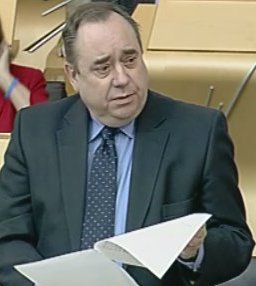LETTER FROM SCOTLAND 23th May 2014
As I write, we are waiting nervously for the result of the European Union elections. Well, “nervously” is perhaps putting it a bit too dramatically. Things happen slowly in Europe. It’s taking us four days to vote but by Sunday night we will know the colours of most of the 751 MEPs – though the final Scottish result will be delayed till Monday because the Western Isles will not be counting its votes until the Sabbath Day hath ended.
Then, curiously, we will not be analysing the figures for what they tell us about how Europe handled the recession or how it’s going to reform the financial industry or tackle immigration or climate change, or any of the other issues that need a continental solution. No, instead we will be wondering if the SNP is going to win a third seat in Brussels and whether the Liberal Democrats will lose out to the Greens or Nigel Farage’s waspish little party.This is a pity because these large continental issues deserve to be debated and resolved. How else are we to protect the environment or ensure a fair market, or avoid a race to the bottom on working hours, safety standards, taxation etc except through the European Union ? But, for the moment, I suppose everything has to be seen through the brightly coloured prism of the referendum.
The Church of Scotland staged a full blown debate on the issue at its General Assembly on Tuesday. There was lots of fine rhetoric but no vote was taken – wisely, since the Kirk, like the rest of Scotland, is deeply divided on Scottish independence.On Wednesday the Assembly revealed itself still divided over the issue of gay ministers. By 369 votes to 189, the Assembly decided to consult further on a compromise which re-affirms the Church’s opposition to gay ministers in principle but allows individual congregations to follow their own conscience and elect gay ministers if they wish.
It’s been a divisive old week. The Scottish parliament was divided – the SNP versus the rest – over the future of the health secretary Alex Neil. The opposition parties accused him of favouring his own constituency by “ordering” the local health board to retain two mental health wards at Monklands Hospital in Lanarkshire. Mr Neil said he’d left the decision to his deputy and the SNP’s majority in parliament made sure the motion of no confidence, the first for 13 years, was defeated by 67 votes to 57.
Did you know that there are 440 police officers in Scotland authorised to carry guns ? And they do so on routine patrol. It seems a lot, for a police force which is supposed to be unarmed. The disclosure by Police Scotland has caused alarm among politicians and human rights groups who say it’s not setting a good example. Happily, the police officers have little to shoot at. Gun crime is at its lowest level for 30 years.Scotland is doing well in the happiness stakes this week, despite all the political divisions above. Inverness is hosting a Happiness Festival this weekend, parading the best of British comedy. It has also come second top in a survey of the happiest towns in Britain by the on-line housing agency Rightmove. Falkirk, it reckons, is the fifth happiest town. Harrowgate in Yorkshire came first with great ratings for friendliness, safety, fine open spaces, good house prices and pride in their community. And the worst place ? East London. Don’t even go there.
Two men who chuckled all the way to their press conference on Thursday were fishermen Jim Reid, aged 75, and his grandson David Irvine, aged 35. They were telling their story of being found after two days lost at sea off the Aberdeenshire coast. They set off in their 16ft creel boat from Gourdon harbour on Tuesday to collect a few lobster pots. But, in thick mist, their compass broke down and gave them a false reading. They headed east instead of west and ran out of fuel 50 miles offshore.A huge search was mounted but no one thought to search so far out to sea. The two men said they’d survived on a flask of tea and two biscuits and cursed each other till eventually they attracted the attention of a passing fishing boat. Miracles do happen…even in the North Sea.
They happen in Perth too. Because, for a moment last weekend, it must have overtaken Inverness as the happiest town in Scotland when the home team St Johnstone paraded the Scottish Cup through the streets of the fair city. It was the first time they’d won anything in their 130 year history.
Over in Glasgow, Neil Lennon is happy enough with his silverware. But he announced on Thursday that he was leaving Celtic after four years in charge. Apparently he felt he’d taken the club as far as it could go in the shallow waters of Scottish football and he’s off to swim with bigger fishes.
So where does that leave Glasgow in the happiness stakes ? That depends on the success of the Commonwealth Games which this week finally sold its last 100,000 tickets. I can exclusively reveal that the opening ceremony will include a sequence in which the Queen and Sir Sean Connery will drop by parachute into the arena singing “I belong tae Glasgow” accompanied by Mr Bean on the keyboard. Now that would make me happy.






































